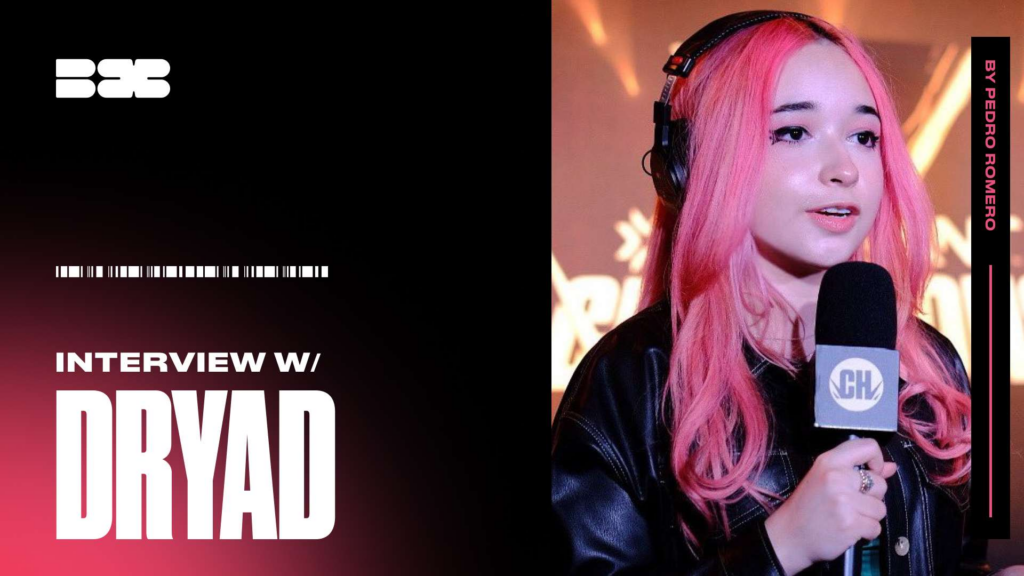In the second part of BLIX.GG’s interview with VALORANT caster Daniela ‘Dryad’ Herrera, she goes in-depth on why she decided to cover FPS games, her growing presence in VALORANT, and how she reflects on her career thus far. You’ll find more of Dryad’s thoughts, as well as the beginnings of her esports journey in part one.
Covering FPS games
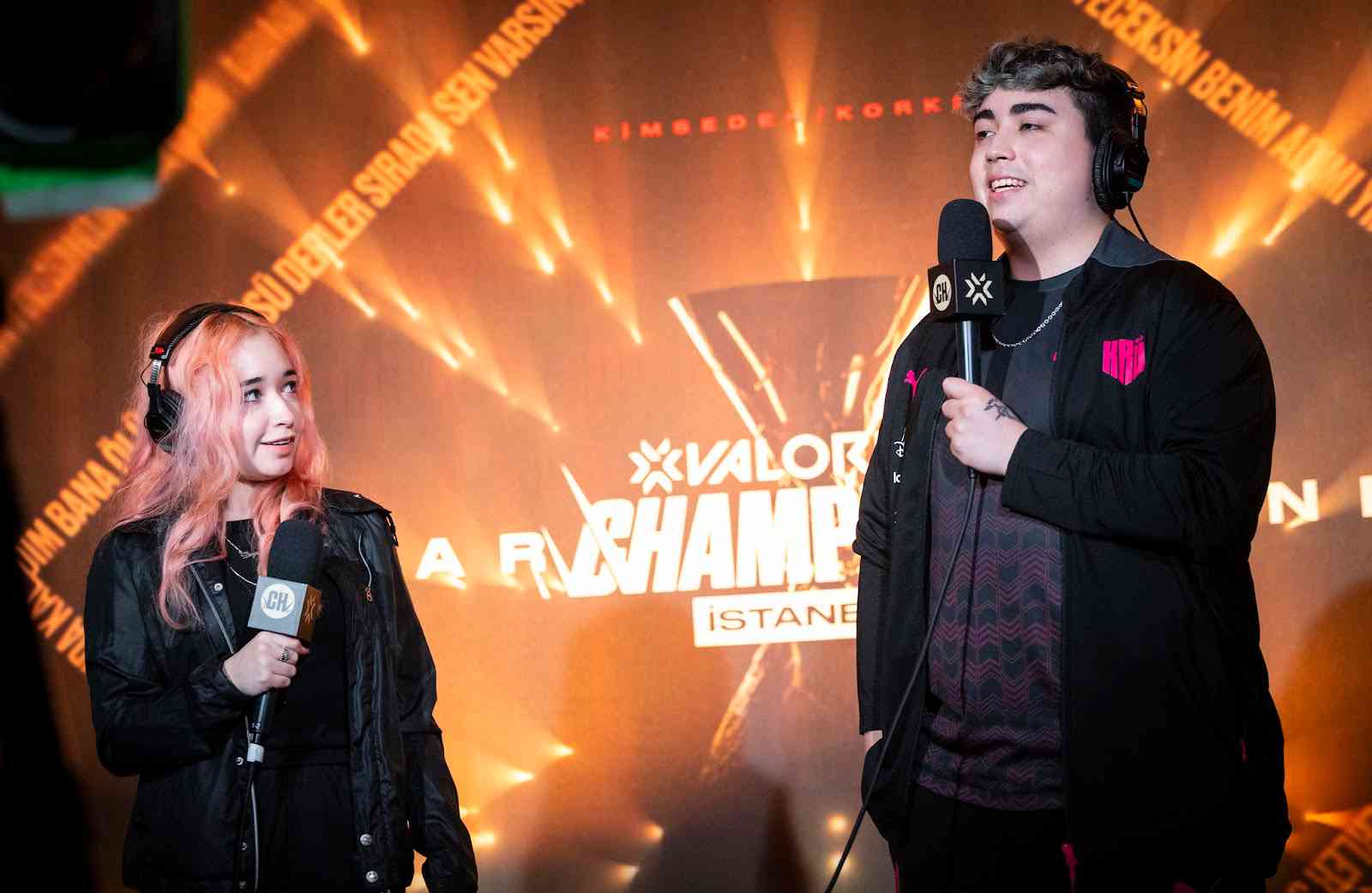 Dryad working an interview with KRU Esports’ Roberto “Mazino” Bugueño during Champions 2022
Dryad working an interview with KRU Esports’ Roberto “Mazino” Bugueño during Champions 2022(Credit: Riot Games/Colin Young-Wolff)
Pedro Romero, BLIX.GG: When you started working in esports by covering VALORANT, Overwatch, and Call of Duty, why did you specifically focus on FPS games?
Daniela ‘Dryad’ Herrera: It was just the games that I liked, honestly. I tried a bunch of other games like League of Legends and card games and I never really liked them. I just wanted to do FPS. Overwatch was the first one that I did since it’s the one that came naturally to me, Call of Duty is a game I played as well so I wanted to give it a try because, if there was a second game I would do, it was going to be that.
It was mostly hosting rather than casting and that was to just get a feel for it and get more interview experience because that is what I wanted to do early on in my career. Yeah, it was just that FPS games are the games that I’m passionate about, and, for me, everything is just about passion and what I feel. I wouldn’t like to do something that feels either forced or doesn’t feel it comes naturally to me and VALORANT and Overwatch specifically definitely did.
BLIX: Do you feel you sometimes struggle in trying to cover many games at a time?
Dryad: Oh yeah. Honestly, I’m giving pretty much 200% to VALORANT right now. Every time I can, I’m dedicating time to VALORANT and it’s especially VALORANT because it’s crazy time-consuming. When I’m working at this level, where I’m doing NA and Latin America for these events, you need to watch all these teams, watch all the VODs, watch all the maps that they played, take notes, and that takes hours and hours and hours.
At that point, you know that if you’re doing multiple games as a caster, especially as a color caster because that’s the point where you’re analyzing and catching patterns and all these things about the teams, you’re dedicating all that time, and if you want to do another game, you know either you’re not going to have the same amount of time for that second game or it’s going to be kind of 50/50 for both when you could do all of that for one game.
BLIX: What would you say has been the biggest difference in working those three games?
Dryad: It’s really fast-paced and I feel everybody has always known because it was quick, you reset, and you go again. As a color caster, my approach was knowing I have 20 seconds to this point about the fight that just happened or is going to happen and I’m done. Then you go play-by-play, tell everything that was going on in the fight, and then we do it again. It’s quick and it’s very coordinated in that sense, where you know exactly how the pattern is going to work once you get used to it. There are a lot of different styles that people have brought to that casting style and it’s a lot more analytical.
The game is always changing and bringing crazy changes, when I was casting Overwatch, that was not the case. At that point, the game was a little bit stale, so I had my information and it was gonna stay like that for at least a couple of months, if not way more. For VALORANT, it’s always changing and you’re always having to learn more. It’s way more analytical. The color-casting ceiling is pretty high. You are always learning and you have to keep up with everything that is going on.
For Call of Duty, I feel like my approach was completely different because I started trying to mostly do interviews for a couple of events. I also did hosting for a couple more events, and then there was only one time where I tried casting, I thought it was okay but I didn’t want to do it anymore because I just wanted to dedicate myself to Overwatch at that point.
Presence in VALORANT
BLIX: It’s obvious that you made your biggest presence known in esports when it comes to working in VALORANT. From working Tier-2 events, you’ve gone on to work in major tournaments like Game Changers, Masters, and Champions as an interviewer and analyst. How have you viewed your emergence within VALORANT in particular compared to the other two games?
Dryad: At the beginning, and when the game came out, it was a little bit difficult because I wanted the game to come naturally to me. I wanted to play the game and see how it felt so I took my time and when I got into it and started casting it, I pushed myself to do more. One big push was the Game Changers Caster Training Program that I did and got selected for.
The people were chosen by Riot and it was six girls who all went to LA for a week. We had a seminar kind of thing where we talked to all the casters, hosts, and analysts of the scene. They taught me about color casting, our presence, how you should look, and how much teleprompting could matter at some point. It pushed me in learning and I took all these notes and I asked all those questions when I was over there because I wanted to be the best.
After that, I was applying everything that I learned by asking people and trying to get myself to be as involved in the scene as I could. I don’t know why but the Hannah Montana “best of both worlds” thing always comes to me when I say this. I have the best of both worlds where I get to do English and Spanish VALORANT and I get to push that scene and make that international connection and that is because of all the hard work that I took in learning the game properly, talking to all these people, and going through days and days of casting nonstop.
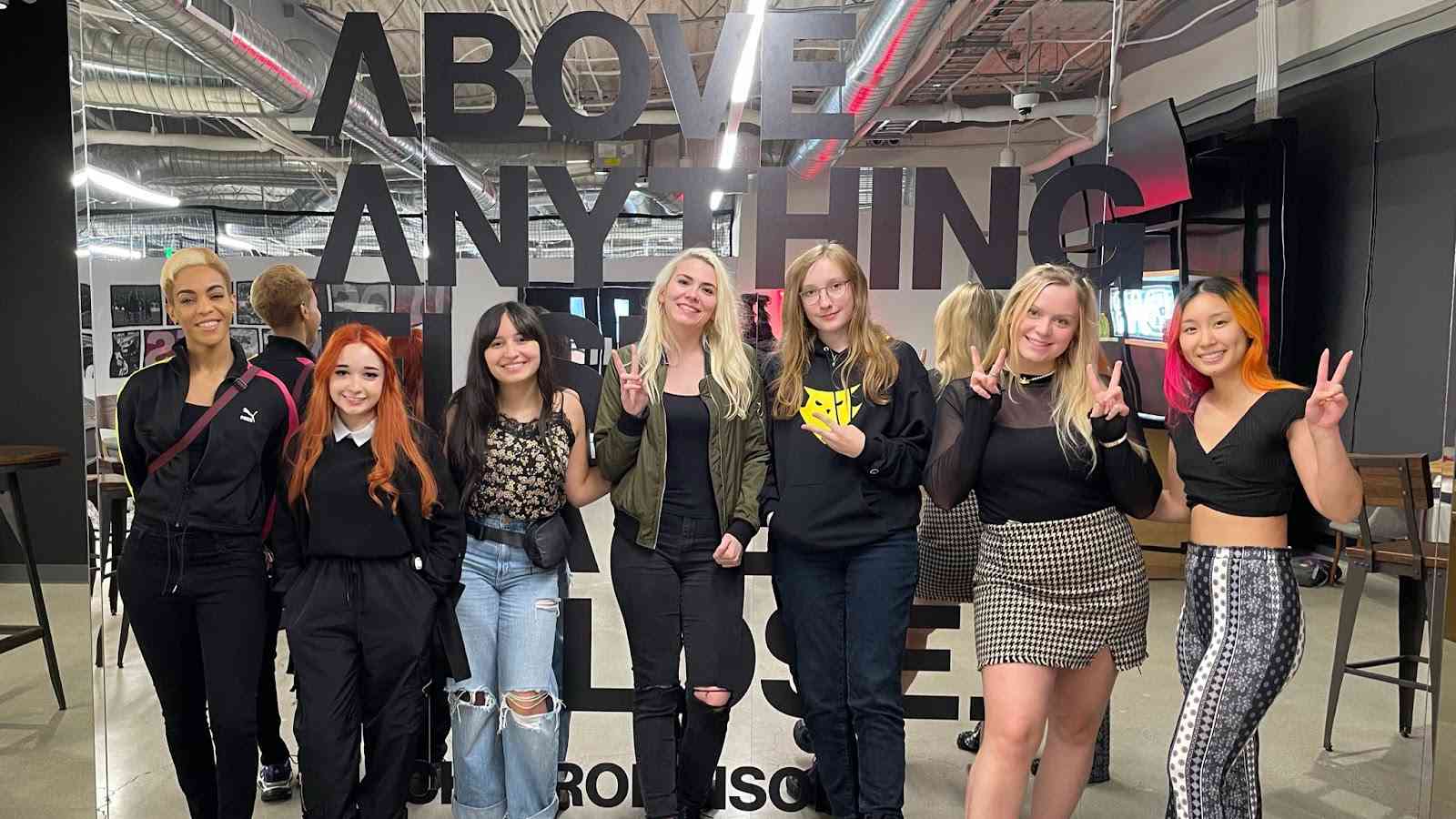 Dryad alongside Darlyn Diaz, Sierra Hunder, Mimi Wermcrantz, Jodi Gillam, and Ashley Bang after a class during the Game Changers Caster Training Program
Dryad alongside Darlyn Diaz, Sierra Hunder, Mimi Wermcrantz, Jodi Gillam, and Ashley Bang after a class during the Game Changers Caster Training Program (Credit: Erin Ashley Simon/Twitter)
BLIX: What was the biggest piece of advice that you received during that time and who said it?
Dryad: That was in November of 2020 when we did that casting program and the biggest advice was actually from Pansy (Lauren Scott), who’s someone I look up to. We had a talk about finding inspiration outside of esports and at that point, it just never really crossed my mind. She talked to us about how you can bring those interests into your own casting. She was giving an example of how she likes reading fantasy books, I believe, and she was giving us some examples that she brought in during some casts.
Then we had homework, and it was “think of things that you like outside that you could bring to your casts.” And even to this day, I think about it. What can you bring from my life and all the things that I like into my casting? I still think about it all the time. It’s like how can I bring more? How can I bring more of my personality and more of who I am into these stories?
BLIX: What would you say has been your best casting performance up until now?
Dryad: I feel no matter what level you are in as a caster, you always want your best cast to be your last. When I think of what is the best cast, I’m thinking of the cast I had two days ago when I was in Challengers and I was like, “this is pretty good.”
Especially for the English standards that I hold myself accountable for, it’s like “that’s pretty good. I got to improve on this and that and these are the things that I’m wanting to work on.” As for Spanish, it’s kind of the same thing. Though there are obviously moments and specific casts that I remember well, as for the overall cast, I feel it’s always going to be that last one.
The opening series of NA Challengers between FaZe Clan and G2 Esports saw Dryad work as its color caster.
BLIX: This is slightly off-topic, but about KRU Esports’ Champions 2021 semi-final run, as someone based in LATAM, how did you experience that event?
Dryad: When KRU had that crazy run in Champions 2021, I was going crazy. It was just so fun to watch. That was before I got into casting VALORANT at all so I was just watching them as a fan. It was just so fun watching them win against all these big-name teams. The reason why I have pink hair is because of KRU.
I was like, “if KRU wins against fnatic, I’m going to dye my hair pink” and they won, so I did it. I wish they would have made it further. I love KRU so much. Even when they’re not winning and they’re losing, you just want to support them.
BLIX: Who has been your favorite person to interview or work with when you’re in those international VCT events?
Dryad: There are a couple of really good interviews I’ve gotten the chance to do but I feel the one that is most memorable is the stax (Kim Gu-taek) interview. It was just such a crazy moment and I feel it’s something so simple, right? Saying vamos is insane and it goes everywhere, and I saw it everywhere and people were loving it because he’s just such a personality and I’m so happy that we get to enable that even more in those interviews.
Reflecting on her career
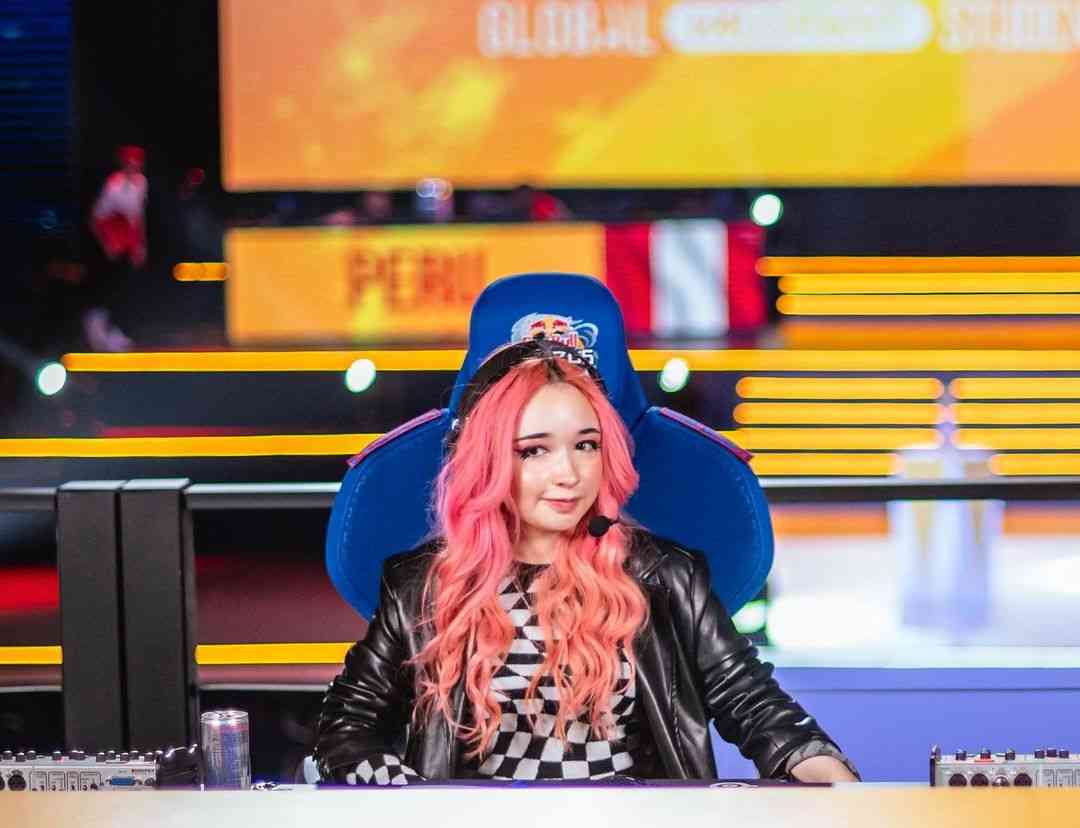 Dryad working Red Bull Campus Clutch 2022 as a commentator
Dryad working Red Bull Campus Clutch 2022 as a commentator(Credit: Red Bull)
BLIX: What do you feel has been your proudest achievement so far in your career?
Dryad: I think everything that I’ve done in the past year are things I’m just so proud of, including those international events. Champions was a big one for me because I got to be there for the entire event and I got to do all those interviews.
I would say maybe that one, but honestly, every single one of those international events were things I’ve been super excited about. Just the way that people kind of talk about it makes me happy because it is what I always wanted to do. It’s cool to see that, event, after event, I’m accomplishing everything that I wanted to do in the scene.
BLIX: You were named as one of the casters to work in NA Challengers for this year. Were you surprised that you were chosen to work at that event?
Dryad: I was really nervous because I knew I was definitely one of the potential candidates with the way that I was working with Tanner and how we had improved so much since the first cast that we had, but I was nervous because there’s also a lot of really talented people at this level. Actually hearing that I was part of it just made me so happy because I’m gonna be able to do that this year.
It’s just like, “Wow, I’m really casting all these teams that I watched.” This includes The Guard, TSM, FaZe Clan and all these teams that I watched last year and I get to do it in English, right? I want to make sure that I’m pronouncing things right and I want to make sure that I’m following the standard of English casting and I push myself really hard in that sense, so the fact that I’m considered at this point to cast all these insane teams, it feels really good. It makes me happy to be in this place because, for English, I worked extremely hard to be able to be in this position.
BLIX: You said you want to continue working to get a bigger presence within the scene, but what is your ultimate goal? What would you say is your “end all be all” in all of esports?
Dryad: As a personal goal, as always, I want to push myself really hard in everything that I do because the work is never done. Always keep improving, keep making changes if necessary, and keep working with people that are great to work with and allow you to improve as well. But also, in more the way that I want to have an impact, besides those kinds of personal goals, I always want to connect the international scene and make it more together with Latin America and North America.
I love how Riot is doing it now with the Americas League and all those events but I want to do even more. I feel it’s an obvious connection that should have happened so long ago. People think of NA and EMEA but LATAM is right here. It can also make a story for that. In VALORANT, it’s been a good journey to push for that too so I want to do that through interviews. I want people to feel like they’re also part of the story because LATAM always feels like it’s kind of forgotten and left behind in esports, so it’s good that VALORANT is making sure that’s not gonna happen.
BLIX: Is there a moment that you recall in which you made it in esports?
Dryad: I think the first really cool moment where I was like, “wow, I’m really doing this” is the first international event that I did and that was actually not for VALORANT. I did Twitch Rivals Amsterdam and I was like “this is just so cool. I can’t believe that I get to be part of this and go there.”
For VALORANT specifically, I think Champions was a good one where I was so proud of everything that I’ve done. I was in Istanbul for 26 days and it was a crazy long time being there. After looking back at all those interviews, I was so proud. And I feel the people also felt what I felt. The impact that I wanted to have in the community actually landed so it was nice.
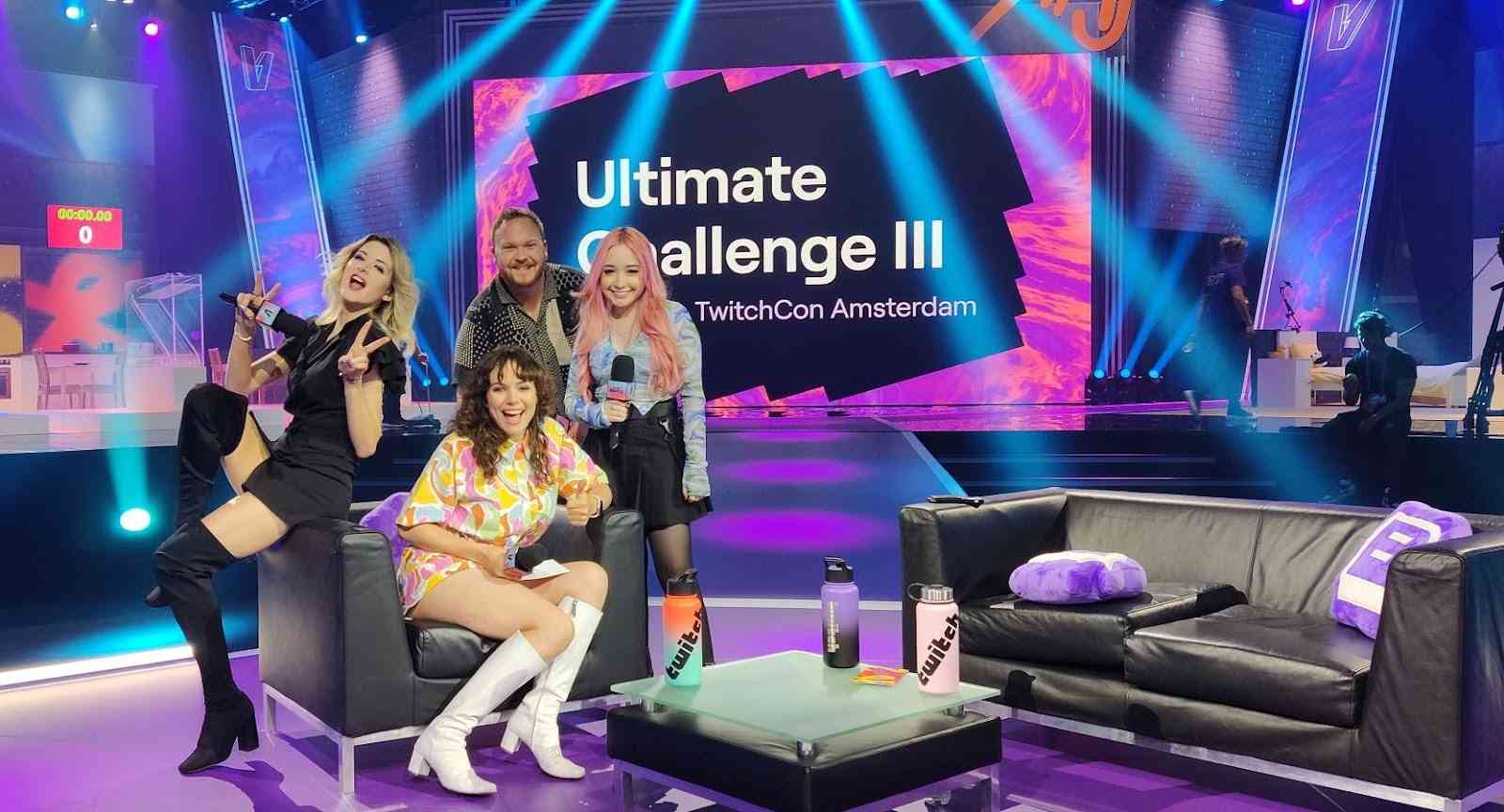 Dryad working Twitch Rivals in Amsterdam, Netherlands
Dryad working Twitch Rivals in Amsterdam, Netherlands(Credit: Dryad/Twitter)
BLIX: How would you want fans to look at the contribution you’ve made to both LATAM and NA given that you’ve been covering both regions?
Dryad: Overall, I just want people to see how passion can take you to all these crazy places if you are working hard as well. If that passion is making you work hard and do all these things to get better, that’s good. I also want people to see me as someone that is trying to make that connection between Latin America and the rest of the world and for people to see that anybody can do it.
Sometimes you get messages from people saying, “I want to cast in both languages. How are you doing it? What do you recommend?” When I stream once in a while, I get people asking me how I learned English, how I can cast in both languages, or how do you get to practice and things like that. Sometimes you need that kind of example and I hope I can be that example for people to realize you don’t have to stay in that smaller community, but you can always do more.
BLIX: Among women in LATAM, you’ve been one of the most prominent within VALORANT given your recent track record in covering NA Challengers on top of working in Masters and Champions. What is the biggest advice you can give to LATAM women who want to pursue a career in the scene in esports?
Dryad: In general, it would be the advice to do what you love. If that is casting, then do casting. If there’s a game that you like specifically, then pursue that game. Just follow what your heart is telling you to do. Honestly, it can go to anybody, but I feel like girls can receive a lot more criticism, especially if you’re going into an analyst role and things like that.
The biggest advice that I can give somebody is don’t take criticism from people you wouldn’t take advice from. If you see Twitch chat going crazy, would you really take advice from them? Do they really actually contribute anything to you? It’s just questions like that where you get to separate things and if you really want to improve, you go to people that you look up to and admire rather than people you don’t really know that try to have a way into your life that is not positive.


